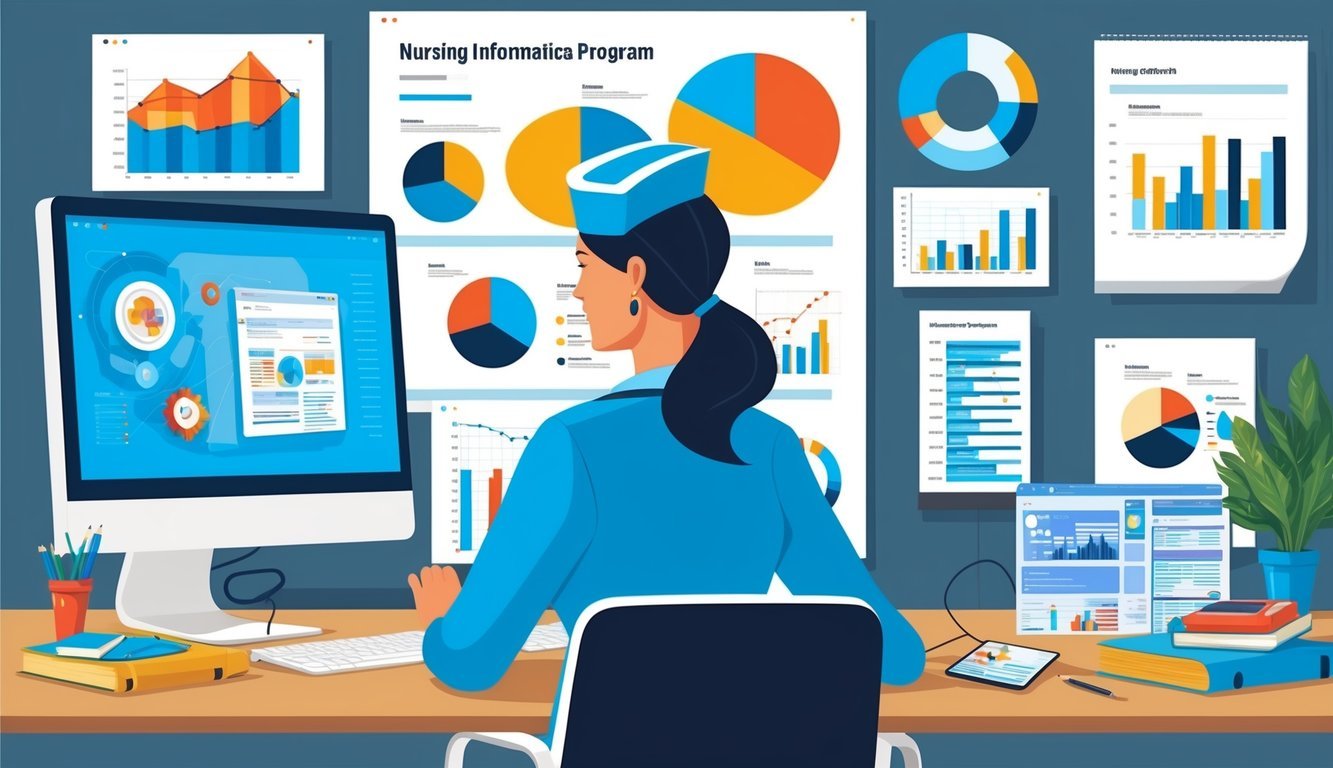In today’s rapidly evolving healthcare landscape, the integration of technology and nursing is more critical than ever. Nursing informatics programs equip you with the necessary skills to enhance patient care through efficient data management and the use of health informatics. As a professional in this field, you will play a vital role in bridging clinical practice and information technology, leading to improved healthcare outcomes.
Choosing the right nursing informatics program can significantly impact your career trajectory.
Many universities offer specialized MSN degrees that focus on areas such as data analysis, system management, and project implementation, which are essential for making informed decisions in patient care.
For instance, programs like the one at Texas Tech University Health Sciences Center stand out by preparing you for various informatics roles within the nursing profession.
By pursuing a degree in this discipline, you will not only advance your knowledge but also contribute to transformative changes in healthcare systems.
You will find that programs cater to both full-time and part-time students, often allowing for online coursework and flexible scheduling.
Explore options like those offered at the University of Maryland School of Nursing and Chamberlain University to find the perfect fit for your career goals.
Understanding Nursing Informatics

Nursing informatics plays a critical role in optimizing patient care through the effective use of healthcare technology.
It combines nursing science with information management to improve patient outcomes and enhance the quality of care provided.
The Role of Informatics in Nursing
Informatics nurses serve as a bridge between clinical practice and technology.
They utilize data analysis, system optimization, and evidence-based practices to enhance healthcare processes.
A few key responsibilities include:
- Data Management: Informatics nurses streamline the collection and analysis of patient data.
- Technology Integration: They help implement Electronic Health Records (EHRs) that improve communication among healthcare providers.
- Training: Educating staff on new technologies ensures efficient utilization.
By enhancing how nurses access and use information, you can significantly improve patient outcomes and operational efficiency.
Evolution of Nursing Informatics
Nursing informatics has evolved alongside advancements in healthcare technology.
Initially focused on basic data collection, the discipline now emphasizes sophisticated data analysis and system interoperability.
Key milestones in its evolution include:
- Introduction of EHRs: These systems revolutionized patient data accessibility.
- Regulatory Standards: Establishing guidelines for data management improved consistency in patient care.
- Interdisciplinary Collaboration: Informatics now fosters teamwork among nurses, IT professionals, and administrators.
The result has been a more integrated healthcare system where patient outcomes are enhanced through improved data flow and usability.
For examples of leading nursing informatics programs, consider resources like Nurse.org.
Education and Certification

Pursuing a career in nursing informatics requires a solid educational foundation and relevant certifications.
This section details the degree pathways available, accreditation standards, and the essential certifications for informatics nurses.
Nursing Informatics Degree Pathways
To enter the field of nursing informatics, you typically need a Bachelor of Science in Nursing (BSN) or an Associate Degree in Nursing (ADN).
Many advanced roles require a Master of Science in Nursing (MSN) with a specialization in nursing informatics.
Programs often include coursework in data management, health information systems, and clinical practices.
| Degree Type | Typical Duration | Key Courses |
|---|---|---|
| Associate Degree (ADN) | 2 years | Nursing Fundamentals, Anatomy |
| Bachelor of Science (BSN) | 4 years | Leadership, Informatics Principles |
| Master of Science (MSN) | 2-3 years | Advanced Informatics, Research |
You can find MSN Nursing Informatics programs that are designed to equip you with the necessary skills to analyze and improve healthcare data management.
Accreditation and Credits
Accreditation is vital as it assures the quality of your educational program.
Look for programs accredited by organizations like the Commission on Collegiate Nursing Education (CCNE) or the Accreditation Commission for Education in Nursing (ACEN).
It’s also important to consider how many credits you will need for your degree.
Typical credit requirements may range from 60 credits for an ADN to 130 or more for a BSN.
An MSN generally requires approximately 36 to 48 graduate credits.
Key Accreditation Highlights:
- Ensure the program meets the standards required for nursing informatics.
- Accredited programs can enhance your employment opportunities.
Certification for Informatics Nurses
Certification is a key step in establishing your credibility in the field.
The American Nurses Credentialing Center (ANCC) offers the Informatics Nursing Certification (NI-BC™), which is recognized widely.
To qualify for certification, you typically need to:
- Hold a current RN license.
- Complete at least 30 hours of continuing education in informatics.
- Have a graduate-level informatics nursing program that includes a minimum of 200 hours of faculty-led clinical practice.
Certification not only validates your expertise but can also improve job prospects and professional growth in nursing informatics roles.
Explore more about the certification process through the ANCC.
Top Nursing Informatics Programs
Choosing the right nursing informatics program is crucial for your career advancement in healthcare technology.
This section explores university-based options and online programs, highlighting key institutions and their offerings.
University-Based Programs
University-based nursing informatics programs provide a structured environment with direct access to faculty and peers.
Here are some notable programs:
| University | Program | Key Features |
|---|---|---|
| University of Pittsburgh | MS in Nursing Informatics | Focuses on electronic health records and data management. Tuition: $23,696. |
| Duke University | MSN in Nursing Informatics | Emphasizes leadership in health information systems. |
| University of Utah | MS in Nursing Informatics | Prepares you for roles bridging technology and patient care. |
| Texas Tech University Health Sciences Center | MSN in Nursing Informatics | First in Texas and addresses critical gaps in nursing education. |
| University of South Alabama | MS in Nursing Informatics | Combines clinical skills with technology management. |
These programs equip you with practical skills for various career paths in informatics.
Online Nursing Informatics Programs
Online nursing informatics programs offer flexibility, allowing you to manage your education alongside professional duties.
Consider these options:
| University | Program | Tuition |
|---|---|---|
| University of Maryland, Baltimore | Online MSN in Nursing Informatics | $16,546 |
| Grand Canyon University | Online MSN in Nursing Informatics | $10,760 |
| University of Colorado Anschutz Medical Campus | Online Nursing Informatics | Focuses on system management and clinical decisions. |
| Troy University | Online Master of Science in Nursing Informatics | Prepares you for leadership roles in informatics. |
These online programs are ideal for balancing your nursing career while gaining essential informatics skills.
Career Advancement in Nursing Informatics

Advancing in nursing informatics involves exploring specializations, leadership opportunities, and understanding the job market and salary expectations.
You can enhance your career through targeted education and experience, which can position you for significant roles in healthcare.
Specializations and Leadership Roles
In nursing informatics, you can choose various specializations such as Clinical Informatics or Nursing Informatics Specialist.
Each role focuses on integrating technology into patient care and improving healthcare outcomes.
As a Nursing Informaticist, you often engage in data management and utilize electronic health records (EHR) effectively.
Leadership opportunities in this field might involve positions like Clinical Analyst, where you oversee applications used in clinical settings.
Further education, such as a DNP, can open doors to higher-level positions and enhance your influence within healthcare organizations.
You can aspire to lead teams that implement new technologies or strategies, making significant contributions to healthcare practices.
Job Market and Salary Expectations
The demand for nursing informatics professionals continues to grow, driven by ongoing advancements in health technology.
Your entry-level position as an Informatics Nurse can offer an annual salary ranging from $60,000 to $70,000.
As you gain experience, salaries typically rise.
An experienced Informatics Nurse can earn between $70,000 and $90,000, while those with advanced degrees or certifications often exceed $100,000 annually.
Salary expectations may vary depending on your location, organization, and specific responsibilities.
Understanding these factors can help you negotiate effectively and ensure you are compensated fairly for your expertise.
Integrating Informatics in Healthcare

Integrating informatics in healthcare enhances systems, improves patient outcomes, and creates efficient workflows.
Understanding its components can empower you to utilize technology effectively within your practice.
The Impact on Healthcare Delivery
In healthcare delivery, informatics plays a crucial role in streamlining operations.
Clinical information systems enable real-time access to patient data, which supports quicker decision-making.
With electronic health records (EHRs), healthcare teams can share vital information across different locations.
This connectivity reduces redundancy and minimizes errors, ultimately contributing to better patient safety.
Furthermore, integrating informatics allows for data analytics, which can identify trends in patient care.
By analyzing this information, you can implement targeted interventions that improve health outcomes.
Technology and Patient-Centered Care
Patient-centered technologies promote engagement and self-management in healthcare.
Tools like patient portals and mobile health applications empower you to take an active role in health decisions.
These technologies facilitate easy access to health information.
You can monitor your vital signs, schedule appointments, or communicate with healthcare providers more effectively.
Incorporating technology into patient care also helps personalize treatment plans.
Tailored approaches ensure that individual preferences and needs are considered, enhancing patient satisfaction and adherence.
Ethics and Confidentiality
Healthcare informatics must prioritize ethics and confidentiality.
As you integrate technology, remember to respect patient privacy and data security.
Electronic health records must comply with regulations like HIPAA.
These regulations ensure that sensitive information is protected.
You must also understand the implications of data sharing, particularly with third-party applications.
Training in informatics should emphasize ethical considerations to prevent data breaches.
Using secure systems and maintaining confidentiality builds trust between you and your patients, which is vital for effective care.
| Key Aspect | Considerations |
|---|---|
| Patient Privacy | Compliance with HIPAA |
| Data Sharing | Risks with third-party applications |
| Training | Emphasis on ethical standards |

